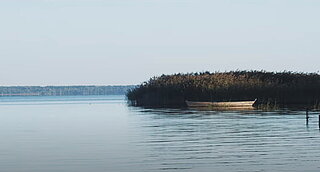Recovery of ecosystem functions in the Ukraine

IKI supports Ecosystem-based Adaptation in the Roztochya biosphere reserve in the Lviv region.
A few years ago in the Roztochya biosphere reserve in the Lviv region of the Ukraine, no one could understand what was happening to the local environment. Changes included drying of springs and marshes; decrease of ground water level, shallowing of river and wells, increased number of fires etc. According to the reserve meteorological station, an average annual temperature of air has increased by 1.4C in the last 10 years and by 1.7 C in the last 5 years. Other regions of Ukraine face similar problems. The reason for these dramatic changes are mainly related to climate change, however anthropogenic pressure on nature is exacerbating the problem.
To address the issue of Climate Change Adaptation in Ukraine, in 2018 the project “Ecosystem‐based Adaptation (EbA) to climate change and regional sustainable development by the empowerment of Ukrainian Biosphere Reserves” was launched as part of International Climate Initiative (IKI). The project is implemented by the Michael Succow Foundation, together with the Centre for Econics and Ecosystem Management at Eberswalde University for Sustainable Development. The project goal is to integrate an EbA approach to national and regional planning and action, leading to better-adapted land use and to incentivize sustainable development in times of accelerating climate change.
EbA to climate change is an approach to conserve existing functional ecosystems, reduce human stress on ecosystems, and restore ecological structures and processes to increase overall system functionality and health. It aims at protect human lives, livelihood, and wellbeing by conserving and restoring fundamental ecological functions.
Biosphere reserves as pilot projects
The biosphere reserves provide excellent ground for exploring and showcasing EbA measures because of their potential to test, monitor, and collect scientific information on their effectiveness in all key ecosystems of the country over long periods. They hold and involve key stakeholder groups (such as researchers, active civil society, NGOs, etc.) to implement and maintain measures of climate adaptation based on ecologically sound principles. By cooperation, research, and capacity building, they can strengthen the possibilities of local executives and bodies of local governments to develop and undertake measures for prevention and adaptation of climate change impacts.
Besides policy and capacity building work on EbA approach, implementation of practical EbA demonstration measures within the Ukrainian biosphere reserves was another goal of the project. Based on an idea contest, 9 out of 29 projects were selected and 3 projects in each of the 3 biosphere reserves Desnianskyi, Roztochya and Shatskyi commenced.
One of them is the Zalyvky Bog Rewetting and Restoration within the Roztochya biosphere reserve. Due to the land reclamation conducted in 1960-1980, most of the peat fields in this region were drained and covered by mono-cultural meadows and grasslands. An arranged dense network of canals also resulted in the change of surface water runoff and sharp lowering of ground water level. The hydrological, hydrochemical, and hydrobiological regime of natural lakes and wetlands including Zalyvky bog were suffering due to these changes. To return Zalyvky bog to the former balanced ecological status, it was deemed necessary to apply the renaturation measures, in order to restore water levels, which decreased after drainage. These measures would result in the creation of required fodder base for waterfowls, improved conditions for nesting, breeding and migration for animals, return of the indigenous plants and animals and the recovery of the ecosystem functionality.
This EbA pilot project together with other 8 projects will contribute to the recovery of the ecosystem functions. It is obvious that only healthy ecosystems can support livelihoods and ensure natural resilience to the adverse impacts of climate change.
The link has been copied to the clipboard
Contact
IKI Office
Zukunft – Umwelt – Gesellschaft (ZUG) gGmbH
Stresemannstraße 69-71
10963 Berlin




